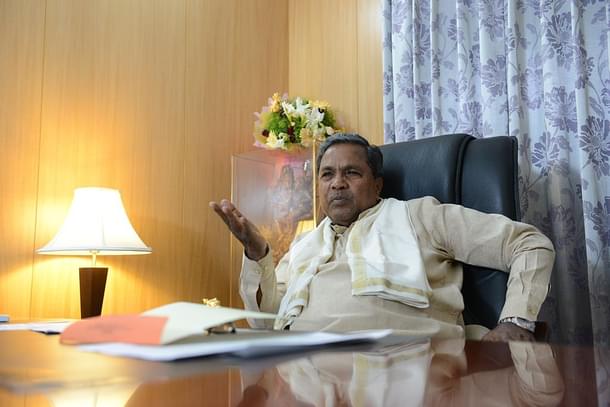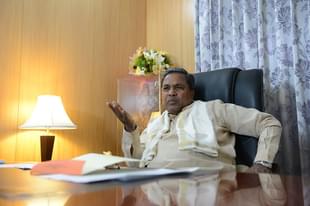Politics
Siddaramaiah’s Amendment To KPME Act Is How Kim Jong-Un Might Deal With Doctors In North Korea
Jagadish Hiremut
Nov 17, 2017, 01:40 PM | Updated 01:39 PM IST
Save & read from anywhere!
Bookmark stories for easy access on any device or the Swarajya app.


Let me start this article by posing this question:
Do we need to regulate private medical establishments and private medical practitioners?
The simple answer is a resounding “Yes”.
Private medical establishments have not covered themselves with glory; we have witnessed how unscrupulous the system has become with eye only on return on investments and profits, especially among the big corporate hospitals. Do you really think big corporates who run hospitals can substantiate their present intensive care unit (ICU) costs of Rs 75,000 to Rs 1,50,000 per day? The answer is “No”.
The smaller hospitals are not far behind. The Karnataka government received a “suo moto” notice from National Human Rights Commission in the year 2015 for deliberate misconduct by private hospitals in Kalburgi. The situation was similar to what had happened in erstwhile Andra Pradesh, where unsuspecting poor villagers and tribals were instilled with fear of cancer of the uterus, and medically untenable hysterectomies performed. In some cases they were performed on women as young as 20 years. Typically all these were done after harvest season. Amongst medical circles this unscrupulous exercise got the moniker, ‘uterus harvesting’. Now that is a criminal act and those doctors and private medical establishments (PMEs) have been rightly punished.
These are just two examples where private healthcare establishments failed the society. There are many more of such incidents that are regularly brought to notice, in addition to similar grievance cases pending before consumer and regular courts.
On the other hand, on a day to day basis, we do find numerous examples of yeoman service provided by private establishments, and being a doctor and a key team member of many lifesaving missions, I shall take the liberty of discounting all those good jobs done by my fraternity till now, in the clause “part of the job”.
Like any other field, where self-regulation becomes inconsequential, and unscrupulous behaviour of a few begins to affect the quality of life of society, in this case too, it is the responsibility of both the government and PMEs as primary stake holders to intervene and bring in legislation or self-regulation for the benefit of all stake holders.
This initiative is more important for the health sector, as private healthcare caters to nearly 75 per cent of the population and fills the gap, which, let us face it, a government setup can never match up to at this juncture.
All doctors and private medical establishment forums in the state are willing to work with the government and its agencies to bring in the much needed regulation in the healthcare sector. A dialogue to this effect was carried out for nearly a year and a half, and at the end of which a clear unwritten understanding was reached too. However, for reasons best known to Karnataka’s Health Minister and Chief Minister, the Justice Vikramjit Sen Amendment to Karnataka Private Medical Establishments (KPME) Act has been tabled in the winter session of the Karnataka Assembly in 2017 unilaterally without including any modifications, which doctors or PMEs wanted.
The medical fraternity needs more teeth for self-regulation. While it wants the government to give more powers to the Medical Council Redressal Cell, the government on its part wants a grievance redressal cell created as part of KPME Act, under which a zilla panchayat chief executive officer acquires powers similar to that of a civil judge in every district. This is untenable to doctors and PMEs.
Medicine is not a perfect science like mathematics and the same treatment on a similar subset of patients is known to produce variable to diametrically opposite results. This needs to be judged by a peer group which can understand the clinical situation better than say a zilla panchayat CEO who has no medical education. This grievance redressal cell is nothing but a kangaroo court set up with unexplained vindictiveness of the present Health Minister and Chief Minister of Karnataka. This move would suit a country like North Korea with dictators like Kim Jong Un and not in our mature democracy, if we consider ourselves as one.
I would also like to bring to the reader’s notice that there are already various grievance redressal mechanisms already available for our patients (now consumers) including consumer courts and regular courts apart from redressal cells in the Medical Council of India (MCI) and states. District Forum headed by a judge, State Commission headed by a High Court judge, National Commission headed by a Supreme Court judge, State Medical Councils, MCI, civil courts, complaints under various sections of the Indian Penal Code 1860, complaints under Monopolies and Restrictive Trade Practices, Public Interest Litigations, etc.
These forums have been quite active, especially since the Kalburgi debacle in 2015, and there is increased civil society activism led by NGOs claiming to be looking after patient interests. Personally, I am very much in favour of strengthening these forums instead of creating another grievance redressal cell headed by a ‘person-ignoramus’. The question we need to ask is why is the Siddaramaiah government hell bent on creating such a forum? Is it to provide alternative sources of income to the political leaders in zilla parishad local bodies? With the formation of the grievance redressal cells these petty political leaders can now create trouble and sit in judgement over decisions by doctors and PMEs.
The Consumer Protection Act (CPA) 1986 was a body blow to the medical profession when Supreme Court in its judgement declared that patients are “consumers” and brought the profession under the ambit of CPA. This has over nearly two plus decades led to a culture of litigation by patients and their attendants (of course the changing times also aided it), resulting in protective practice and increased investigations by doctors/medical establishments and also commercialisation with corporate setups.
The government has made the issue complex by charging water, power, pollution board services and all other services at commercial rates. Imported lifesaving medical equipment are in some instances taxed between 200 per cent and 300 per cent of the cost, service taxes are the highest amongst all services. The question that we need to ask is – why regulate fees in the medical sector after charging the sector at commercial rates? How can service costs be fixed by the government when the burden of running it is on private parties?
Today a hi-tech hospital requires a minimum of five years to start earning money and until then it is mostly running on losses and money pumped in by entrepreneurs or corporates. Is it right on the part of the government to regulate fees in a sector where survival itself is difficult for new entrants? Are the political masters playing to the will of their old corporate hospital buddies, so that new entrants find it more difficult or better still not enter the sector at all - so that they can eventually play the monopoly game? Whatever be the motive, it looks more sinister than the simplistic explanation of “looking for benign interests of patients” to me.
The question “why government hospitals are not included to be inspected and judged by the newly formed committees and grievance redressal cell?”needs to be answered by the health minister. It shows that the motive is to subjugate the hitherto private health sector under the might of all powerful government. It reminds me of Indira Gandhi taking over private banks in a single act; it is to remind us poor doctors that our life and earnings are subject to approval by politicians who run the government who are as of today beyond any reproach. It is a declaration by those politicians in power that, in our democracy all are equal but we the special ones are more equal. The KPME amendment is actually posing a risk to the health of our democracy and informing the citizens that ‘we the people’ stand exposed and are powerless in front of the tyranny of ruling politicians.
At a time when the Chief Minister and the Health Minister should be more worried about the crumbling infrastructure of government health apparatus, they are involved in destroying a system which is providing the much needed support to public. If he cares, Siddaramaiah should make it compulsory for all government officials starting from him to seek healthcare from government hospitals only. He should improve the paper movement of insurance in government hospitals. Do you even know how long it takes for Aroghya Bhagya patients to get effective treatment starting from the outpatient department, Mr Siddaramaiah? If you are truly concerned about poor patient welfare, you should implement patient charter in all government hospitals. Basically you should take up the cudgels for providing clean, affordable, competent medical care to patients in government hospitals or be open to the possibility of the government being responsible for the deaths that resulted due to a lack of infrastructure in government hospitals.
For doctors and PMEs this is a wakeup call to bring in better self-regulation and improve public perception of the medical fraternity.
I state this today with lot of conviction and responsibility: “The healthcare indices of our country and the mean survival age of people has improved largely due the efforts of doctors and PMEs” and less due to government-driven healthcare initiative.
I request all readers to visit your nearest government health setup, it could be a primary health centre, a taluk hospital, a district hospital or a centre of excellence run by government. Give suggestions to government to improve the same and follow it up to check if anybody in the government system cares. Now do the same in a private setup. See the difference in approach of both? Now imagine a day when private hospitals have closed down due to the reckless imprudence on the part of government which you voted for.
As your friendly neighbourhood doctor I am telling you— at this rate, that day is not far away.
Finally as a parting shot: A little bird in state Congress corridors of power informs me that a certain super specialist doctor of an important corporate hospital, who also happens to be the son-in-law of an ex minister in the present government is negotiating with power brokers of Congress for Rs 400 crore as settlement to not bring this amendment. Is it true Mr Siddaramaiah?
The unedited version of the article is available on the author’s blog.
Dr Jagadish Hiremut also known as The Good Doctor is a practicing medical professional and a public healthcare intellectual. He runs a company, ‘ACE Intensive Care Services and Consulting’, which provides intensive care services at low cost to hospitals outsourcing it to his company. He consistently believes value is quality divided by cost and trusts in value-based healthcare services over cost effective healthcare services. He can be contacted on Twitter on @Kaalateetham and email, drjagadish10@gmail.com





